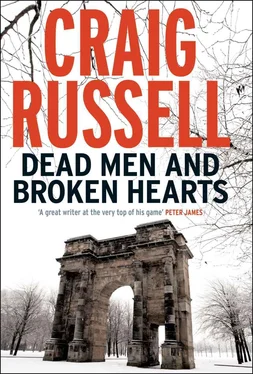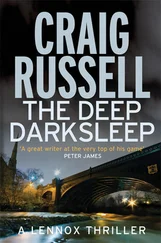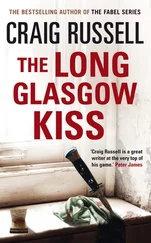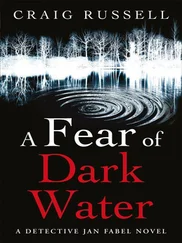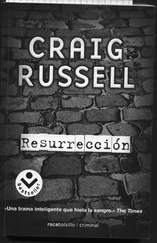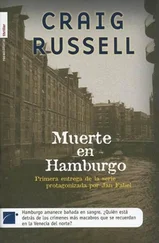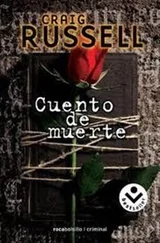Craig Russell - Dead men and broken hearts
Здесь есть возможность читать онлайн «Craig Russell - Dead men and broken hearts» весь текст электронной книги совершенно бесплатно (целиком полную версию без сокращений). В некоторых случаях можно слушать аудио, скачать через торрент в формате fb2 и присутствует краткое содержание. Жанр: Триллер, на английском языке. Описание произведения, (предисловие) а так же отзывы посетителей доступны на портале библиотеки ЛибКат.
- Название:Dead men and broken hearts
- Автор:
- Жанр:
- Год:неизвестен
- ISBN:нет данных
- Рейтинг книги:4 / 5. Голосов: 1
-
Избранное:Добавить в избранное
- Отзывы:
-
Ваша оценка:
- 80
- 1
- 2
- 3
- 4
- 5
Dead men and broken hearts: краткое содержание, описание и аннотация
Предлагаем к чтению аннотацию, описание, краткое содержание или предисловие (зависит от того, что написал сам автор книги «Dead men and broken hearts»). Если вы не нашли необходимую информацию о книге — напишите в комментариях, мы постараемся отыскать её.
Dead men and broken hearts — читать онлайн бесплатно полную книгу (весь текст) целиком
Ниже представлен текст книги, разбитый по страницам. Система сохранения места последней прочитанной страницы, позволяет с удобством читать онлайн бесплатно книгу «Dead men and broken hearts», без необходимости каждый раз заново искать на чём Вы остановились. Поставьте закладку, и сможете в любой момент перейти на страницу, на которой закончили чтение.
Интервал:
Закладка:
‘Is everything all right with you?’ asked Franks. ‘You’ve been missed… a couple of friends have been looking for you two nights in a row. They were really keen to talk to you.’
‘Oh?’ I asked. ‘I’m surprised that they looked for me there.’
‘You left a wallet behind at their place. My card was in it. Your friends are really keen to reunite you with your wallet. Maybe if you were to call by the Club, they would catch up with you.’
‘That’s what I thought. I won’t be able to make it to the Club.’
‘I thought as much. That’s a pity,’ said Franks. ‘Because I found out some stuff about the names of those Bourbon brands you gave me and I was looking forward to chatting to you.’
‘That is a pity,’ I said.
‘I’m afraid I’m so busy I don’t get a chance to chat with anyone. Tonight, for example, I’m working until ten-thirty — then I have to cadge a lift home.’
‘Well, I’m sure we might bump into each other some time soon. Goodbye, Mr Franks,’ I said and hung up.
I headed up to Bearsden. On the way, feeling reasonably secure in a strange car and change of clothes, I drove past my old digs. I kidded myself that I was doing it to see if the police were watching the place but the truth, I knew, was that I just wanted to drive past Fiona’s. The curtains were drawn but I could see the light from the living-room leaching through them. I wondered what she and the girls would be doing, what they would be watching on television or talking about. What an ordinary, safe life would be like.
I drove on.
In Bearsden, I found a public-house car park and left the Cresta there. It was a busy pub, and up-market for Glasgow. Normally in the West of Scotland, if a bar wanted to show itself a cut above, it would have a special rack for you to hang up your bicycle clips next to your flat cap, so I reckoned that, having a car park, this place would be the local bees-knees, no-Catholics-no-Jews watering hole for the local golf-club-swinging crowd — lawyers, accountants and surveyors.
The car park was busy for a Wednesday night and I reckoned the Cresta would be less likely to arouse suspicion left there than parked for a second time in a side street around the corner from my goal.
It was a fog-free night, but not cloudless, and damp-cold without raining. Walking the mile or so to my destination, I pulled the hood of the duffle coat up over my head and cap. The streets of Bearsden were hardly bustling at the best of times and were empty as I walked through them in the chill early evening.
When I reached the road junction, I walked briskly and purposefully across to the other side and out of sight of the black Austin Cambridge sitting outside Pamela Ellis’s home. If the occupants of the unmarked police car had noticed me, then they would simply have seen someone look in their direction to check the road was clear before crossing. The secret was never to look tentative. Maybe, when this was all over, I could write a book: The Fugitive’s Handbook and Guide to Barge Maintenance.
I looped around one block and then another, bringing me to where Ellis’s house and its neighbours backed onto a narrow street that was more an up-market alley. The high brick wall surprised me, as most of the gardens in Bearsden were hedge-or tree-fringed, but I put it down to the fact that the backs of the gardens on one side of the narrow street looked onto the backs of those on the other side, and the walls were probably there to boost security. Even though I would not be overlooked as I scaled the wall, it would be a struggle to get over it and I knew that the locals had the habit of having broken glass cemented into the tops of walls to discourage riff-raff like me.
But it was a problem I would have to wait to deal with. Until eight-ten or eight-fifteen, if my calculations were right.
I walked the length of the narrow street and took a right turn, which meant I was now walking parallel to the one I had originally come down. My orienteering was right and I came back onto the street the Ellis house was on, but a block farther away on the other side, now looking at the back of the unmarked police Cambridge.
I checked my watch. Eight-fifteen. Maybe I was out of luck.
With a lot of time on my hands, I had lain in the barge and thought over every detail and every moment of the last three weeks. I remembered the only time I had visited the Ellis house, catching Pamela Ellis on her way out to her religiously-observed bridge night. And that was when I had gotten the idea.
But, as I stood cooling my heels on the street corner, she was yet to leave the house. There was always the chance that her current state of grief and fear had curtailed Pamela Ellis’s bridge-playing activities. But, even at a time like this, a rubber or two of bridge would be the one distraction I would put my money on Pamela Ellis indulging in.
I waited another five minutes, then ten, and decided I was not going to get the opportunity I had hoped for. My other concern was that hanging around on a dark street corner in Bearsden was a whole lot more conspicuous than in other parts of the city — like neighbouring Maryhill, where it was positively encouraged — and I had already been there for ten minutes.
I was just about to give up when I saw the maroon gleam of Ellis’s Daimler Conquest glide out of the drive. The big question now was whether the coppers in the Cambridge had been told to keep eyes on the house or on its occupant.
‘Come on, boys…’ I urged them near silently and through tight teeth. After what seemed an age, they started up and peeled off from the kerb, following the Conquest along the street and out of sight.
I decided against the high rear wall, instead striding confidently along the street, not slowing my pace as I reached the open drive gate of the Ellis house, where I wheeled breezily into and up the drive. Nothing tentative.
Without breaking pace I walked along the path at the side of the house and into the back garden. The high wall that I had checked out at the end of the garden shielded me from being seen from the large house across the way, but the neighbouring house to my left had a much better view of the rear garden. Fortunately, there were no exterior lights left on which, while encumbering my progress and colouring my language as I tripped over a plant pot, offered me added concealment.
A largish lean-to shed was doing its leaning-to against the boundary wall between the Ellis home and its immediate neighbour. I remembered what Pamela Ellis had said about the shed being her husband’s refuge and his constant complaining about her leaving it unlocked. I tried the handle. Without her husband to reproach her, she had left the door unlocked and I slipped into the shed, using my penlight to check its contents. Even if I found nothing to help me break into the house, the way every screw, nail and tool in the shed was boxed, jarred, arranged by size and labelled gave me hope for my ultimate mission. It was the rigorous, all-or-nothing organization of someone afraid of their own internal chaos, just as Pamela Ellis had described her husband.
Ellis had been an ordnance handler and bomb-disposal NCO in the army, and had then worked his way up the commercial ranks of the demolition business. Exactitude wasn’t just a quirk that gave you an advantage; absolute precision was essential and Ellis had obviously applied it to every aspect of his life.
An old, heavy, double-pedestal desk was used as a workbench with the shelves above it. To one side was a massive-looking chest, made of the same dark wood as the desk. I rummaged through tools in the desk drawer until I found a long, narrow chisel.
Before I headed back out, I cast my torch around the shed once more. I was about to break into a house, a home, yet I felt a greater sense of having intruded here, in this lean-to garden shed. This confined environment was the extension of one man’s personality, of his mind, of his particular way of seeing the world. Right at the start of all of this nonsense, I had quizzed Pamela Ellis to try to get a handle on her husband’s character; I would have been better rummaging through these drawers and shelves.
Читать дальшеИнтервал:
Закладка:
Похожие книги на «Dead men and broken hearts»
Представляем Вашему вниманию похожие книги на «Dead men and broken hearts» списком для выбора. Мы отобрали схожую по названию и смыслу литературу в надежде предоставить читателям больше вариантов отыскать новые, интересные, ещё непрочитанные произведения.
Обсуждение, отзывы о книге «Dead men and broken hearts» и просто собственные мнения читателей. Оставьте ваши комментарии, напишите, что Вы думаете о произведении, его смысле или главных героях. Укажите что конкретно понравилось, а что нет, и почему Вы так считаете.
